As more Brits opt for summer holidays on home shores, local ice cream specialists are responding with imaginative flavours, innovation and passion
The UK holiday is back with a bang. As Britain reaches the end of its hottest summer on record, large swathes of holidaymakers have opted to stay on home shores, rather than venturing abroad. At the start of the year, 63% of Brits set out plans to holiday in their own country, according to a poll of 2,000 people by Sykes Holiday Cottages.
And another UK holiday tradition is booming alongside: local ice cream. “There has been a noticeable and sustained increase in consumer demand for locally produced, high-quality, and ethically sourced ice cream in recent years,” says Catherine McNeil, director of operations at the Ice Cream Alliance.
They’re ordering from the likes of welfare-focused Callestick Farm in Cornwall and slow food pioneer Salcombe Dairy in Devon which make their ice cream in traditional holiday locations in the south west. But innovative ice cream players are also popping up in urban locations. Take Birmingham-based LA-Pop, whose ice cream lollies debuted in 2017. Or Happy Endings, which brought its signature ice cream sandwiches to the capital in 2014.
Openings such as these form part of a wider trend, says the Ice Cream Alliance. There are 701 active ice cream companies on the Companies House register, it points out – 64% of which have been incorporated since 2015, and 32% of which have opened since 2020.
“This signals strong consumer appetite for more diverse, innovative offerings,” adds McNeil.
Above all else, taste is the key selling point. “Most regional producers have passion,” says Hannah Miall, founder of Miall’s in East Sussex. “I love good food and wanted to produce good ice cream.”
That passion shines through in the number of smaller producers winning awards. Just this month, Orkney Ice Cream picked up the Product of the Year gong at the Scotland Food & Drink Excellence Awards 2025 for “pushing the boundaries of flavour”.
Several of the regional producers on this list have scooped Great Taste awards, too – including Callestick, Dorset’s Baboo Gelato and Northern Ireland’s Morelli.
“This year we saw a 9% increase in ice cream entries to Great Taste,” says John Farrand, MD of the Guild of Fine Food. “There are a couple of standout producers that we have watched go from strength to strength. This year, we have seen new names, too.”
Meanwhile, The Scoop Company won the Ice Cream Alliance’s Parlour of the Year Award 2025. The Surrey business was praised for its commitment to bringing out a new flavour each week.
That highlights another strength of regional players: innovation. “This level of creativity and agility is something major corporations struggle with,” says McNeil of the Ice Cream Alliance.
An ability to innovate is also seen in the likes of The Handmade Ice Cream Company, Cumbria, which changes its menu weekly. Then there are trend-led flavours such as Baboo Gelato’s Blood Orange Sorbet or Miall’s Espresso Martini ice cream.
A strong knowledge of all the ingredients behind those flavours is another hallmark of regional producers. Miall’s focuses on local sourcing – buying chocolate from a small business in nearby Hassocks, for example. Baboo is also a champion of local produce. However, where it does need to look further afield, it has the same focus on quality. “Our hazelnut provider in Piedmont, Italy grinds a 100% pure paste for us the day before he ships,” explains co-founder Sam Hanbury.
Such diligence is synonymous with a small operation. Yet many of the regional ice cream players featured in these pages are planning to expand, while staying true to their roots. The likes of Morelli and Callestick are already in supermarkets. So, pay close attention to the 12 regional stars here. Their names may well soon become far more familiar.
Baboo Gelato
Location: Dorset | Founded: 2016 | Sold in: 500+ trade accounts plus own cafés
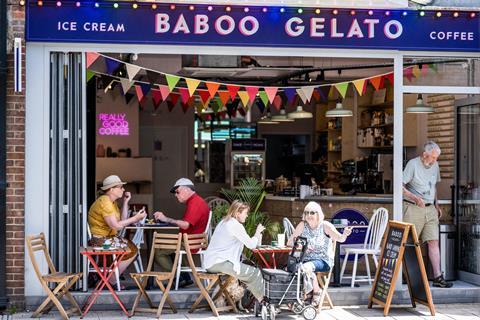
Salted Caramel, Blackcurrant Ripple and Piedmont Hazelnut are just some of the mouth-watering flavours on offer at Dorset’s Baboo Gelato.
The business was founded by husband-and-wife team Sam and Annie Hanbury in 2016, with one bold aim: to make “the world’s best super-premium gelato”. That means respecting the traditional process of making gelato – which contains less fat and sugar than ice cream – and using only the best ingredients.
On the first point, Annie visits Italy each year in the winter to work with specialists on perfecting her recipes. “We make everything from scratch in small batches, pralining our walnuts, puréeing our fruit, cooking our own caramel,” says Sam.
As for the second point, Baboo has kept a focus on quality ingredients – even as its operation has expanded. In 2016, the couple started out using fruit from their own garden. Now it sources from carefully selected local farms, as well as specialists in Italy and Brazil.
For example, Baboo’s hazelnut supplier in Piedmont, Italy “grinds a 100% pure paste for us the day before he ships, ensuring an incredibly fresh and rich flavour”, Sam says.
Meanwhile, milk is sourced from local organic supplier Holy Cow, which has “phenomenal animal welfare standards”.
Finally, Baboo ensures no chemical emulsifiers, gum stabilisers, artificial colourings or flavourings go into the gelatos.
That proposition is fuelling a roaring trade. In peak season, Baboo employs nearly 80 staff across its operations, including branded cafés in Weymouth, West Branded and Lyme Regis. It also sells to 500 trade accounts from London to Cornwall – to names such as Bayley & Sage, Rockfish and River Cottage.
“Our trade sales are growing at 50% per annum, and we hope to accelerate this in the coming months,” says Sam.
On the DTC side, Baboo offers a nationwide delivery service online. And it has big ambitions for the future. “We hope to have made our first exports by year end,” says Sam.
Callestick Farm
Location: Cornwall | Founded: 1989 | Sold in: 500 local customers plus M&S
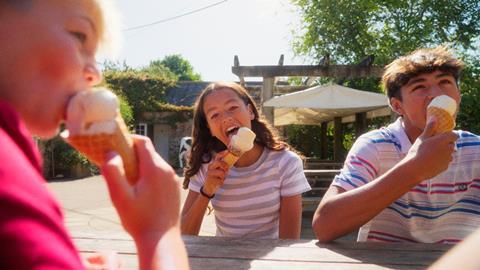
“The healthiest and happiest cows produce the best-quality milk.” That’s the mantra at Callestick Farm, which ensures its 380 cows are free to roam the pastures as they please.
That milk goes into its ice cream, ensuring Callestick has “full control of the production process”. “Our heart and soul goes into each and every single scoop,” says head of marketing Amy Cartmel.
Flavours span Amaretti & Cherries, Clotted Cream & Strawberries and Elderflower Sorbet, all of which have picked up awards for their taste.
The NPD team is now looking at an “exciting” new range for 2026.
Happy Endings
Location: London | Founded: 2014 | Sold in: 15 outlets
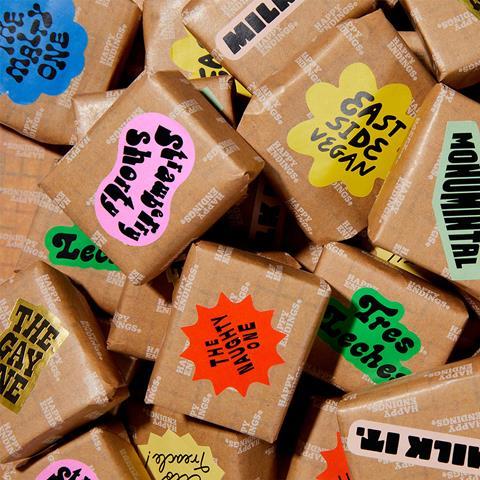
Happy Endings promises “superbly made, scientific beyond belief, high-quality ice cream and dessert”.
It’s made waves in the capital with its signature ice cream sandwiches. Flavours range from The Malty One to Strawberry Shorty and Tres Leches – all concocted by founder Terri Mercieca, an Australian pastry chef who spent years working in fine dining restaurants. “Being Australian, I really love ice cream. It was one of the first things I’ve learned in restaurants,” she tells The Grocer.
When she opened Happy Endings in the UK, she decided to put those skills to good use by creating ice cream sandwiches.
“It was all about taking that restaurant ethos into ice cream,” she explains. “Ice cream sandwiches are really intricate, considered products, and multi-skilled.”
Not that they’re the only format available. Happy Endings has just started making catering tubs of ice cream, designed for venues that want to produce chef-level quality desserts. At the moment, it supplies 15 venues – mostly in London, but also in Manchester.
Happy Endings also sells its creations on Deliveroo and GoPuff, and has a number of pop-up stalls at offices and festivals across the capital.
More from The Dairymen 2025:
-
Inside Arla’s Bovaer crisis and its aftermath
-
Can plant-based dairy avoid the fate of alt-meat?
-
How Yeo Valley is diversifying from dairy and ‘democratising organic’
-
Is a strong year for dairy M&A a sign of a healthy sector?
Highland Fold
Location: Argyll | Founded: 2017 | Sold in: Seven locations
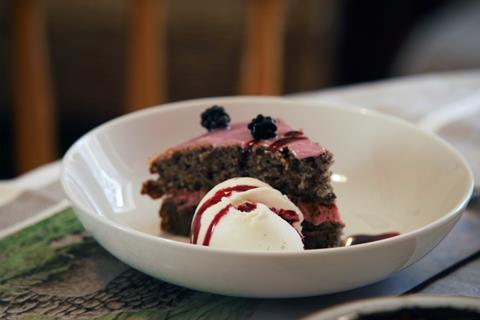
The clue to Highland Fold’s USP is in the name. Based just outside the picturesque Scottish village of Barcaldine, this farm business uses milk from Highland cows to make its signature ice cream.
The cows are milked by hand “to celebrate the culture and heritage of Highland cattle”, says director Jane Isaacson.
That tradition comes through in the flavour. “Highlanders have a butterfat content in their milk of around 8% – nearly double a regular dairy cow – which makes a delicious, natural, milk-flavoured ice cream,” Isaacson adds.
Not all its flavours contain Highland milk however, as demand outstrips supply. For its Natural Flavours range, it uses organic Scottish milk. For its dairy-free Oaties, organic Scottish oats are the base.
That emphasis on locality applies to all ingredients, which are either grown on the farm or sourced from nearby suppliers. That has resulted in twists on familiar flavours. Rather than classic vanilla, Highland Fold uses wild meadowsweet to create its staple white ice cream.
The operation is small – Highland Fold ice cream is sold in just seven locations – but it’s a tourist attraction in itself. Experiences such as a Whispering Cow Walk offer a chance “to meet our cows in their natural environment” alongside “stunning views over to the Nevis Range”.
“We plan to continue building on our specialist farm and food tours to pass on knowledge from our regenerative farm and sustainable local food offer,” says Isaacson.
Lakenham Creamery
Location: Norwich | Founded: 1921 | Sold in: Approx 300 customers
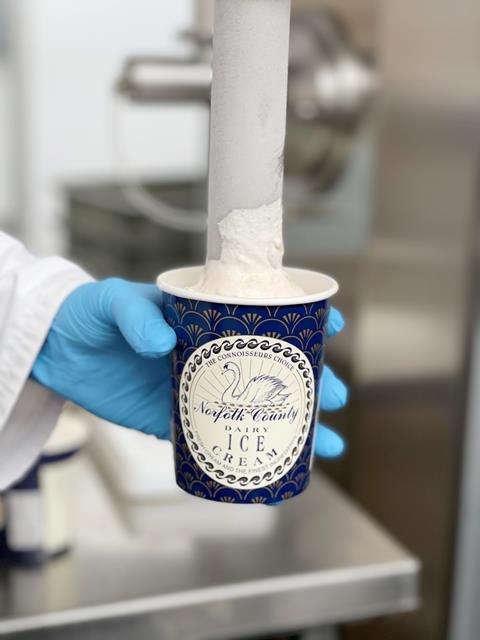
This Norfolk-based ice cream company is backed by plenty of history. Formerly known as Aldous Ices, it was established in 1921 by Christmas Aldous, who spent “four years perfecting the art of producing superior ice cream”.
That means it preceded the arrival of Häagen-Dazs and Ben & Jerry’s in the UK by a few decades. The perfectionist nature of its founder has also resulted in a recipe with a clear USP: Lakenham describes itself as “the only producer in the UK” to use just fresh cream as 80% of the base.
That recipe forms the basis of flavours such as Mascarpone & Fig, New York Coffee and Double Strawberry. They are sold to around 300 customers, including delicatessens, farm shops, bistros, pubs, restaurants and luxury campsites.
All of that is done with only five permanent members of staff. During the summer, it simply employs an additional driver to help with deliveries and two ice cream servers for its stall on Norwich Market. “We are a very small business and consider ourselves family,” says social media and sales manager Amber Haylock.
And, in a sign of a truly year-round operation, it will be unveiling a Christmas flavour this month.
Morelli
Location: Derry/Londonderry | Founded: 1911 | Sold in: 16 branded stores, plus major listings
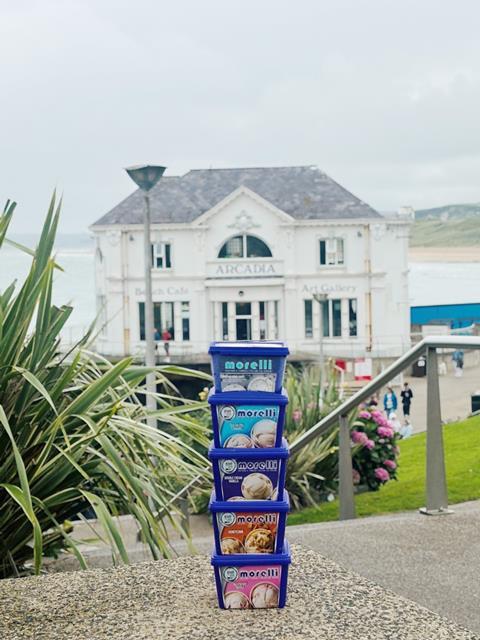
Anyone who lives in Northern Ireland will have heard of Morelli. It’s the biggest regional supplier on this list, with four family-run stores and 12 independently owned branded stores.
It also has listings in Sainsbury’s, Tesco, M&S and Dunnes stores in Northern Ireland – as well as with independent retailers, delis and restaurants.
Founded over 100 years ago, its ice creams are “a traditional Italian recipe, but made with the purest of Irish dairy ingredients”.
“Irish milk, double cream and butter is of a terrific standard,” says Morelli.
Despite major listings, it’s still a relatively small team. It employs around 25 people at its factory in Coleraine.
It has all the innovation and independent spirit you would expect from a small business. For its centenary celebrations in 2011, Morelli broke a Guinness World Record for the longest chain of people licking ice cream: 2,728.
Our Cow Molly
Location: Sheffield | Founded: 2007 | Sold in: Approx 20 locations including own shop
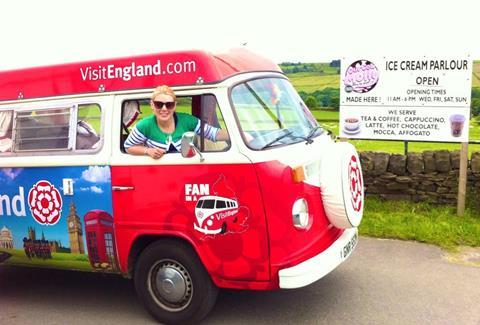
The Our Cow Molly ice cream business is relatively new, but its story dates back to 1947. That’s when Hector Andrew started his dairy farm in Dungworth, on the outskirts of Sheffield. His grandson Eddie Andrew saw an opportunity to make ice cream with the farm’s produce in 2007.
Our Cow Molly’s key selling point – “traditional Italian ice cream but with way more cream” – has attracted its fair share of attention. It scooped a BBC Food & Farming Award in 2016, while Princess Anne visited the farm in 2023.
Red Boat Gelato
Location: Anglesey | Founded: 2009 | Sold in: Three parlours plus 100 accounts
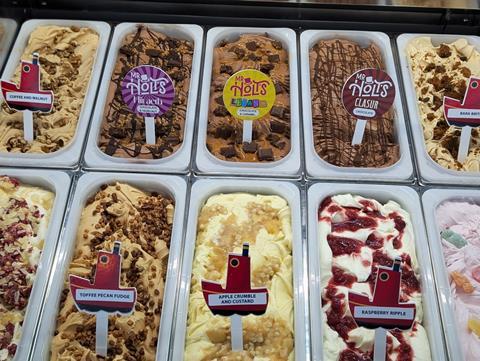
Tony Green trained as a chef in Italy, where he worked with “some of the finest gelato chefs in the world” before bringing that expertise to Wales in 2009 with the opening of Red Boat Gelato’s first parlour in Anglesey. The real turning point came in 2019, when Red Boat opened a “state-of-the-art production hub” and was able to make its gelato on “a much bigger scale”.
By sticking to its artisan roots, the company has attracted over 100 business customers and now runs three parlours.
Salcombe Dairy
Location: Devon | Founded: 1979 | Sold in: Five own cafés plus several partners
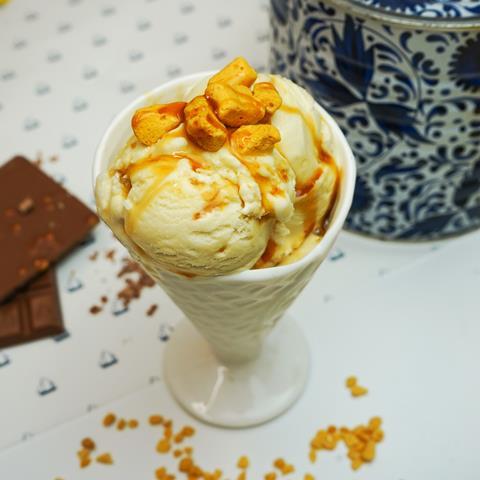
Salcombe Dairy founders Peter and Tricia Howard “championed slow food before it was even invented”, it says. Carrying the torch today are the Boscawen and Bly families, who are just as passionate about artisan food. “Salcombe Dairy ice cream is, and has always been, 100% natural,” says Lucia Bly, who helps to head up the core team of 40.
The business supplies high-end farm shops, delis, scooping parlours, hospitality venues and airlines “where good British food is championed”.
Scoop
Location: Surrey | Founded: 2023 | Sold in: Two sites, one more coming soon
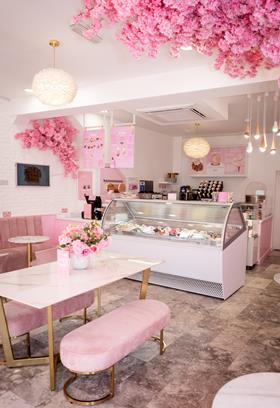
The Scoop Company earned the title of Parlour of the Year 2025 for good reason. The Ice Cream Alliance recognised “bold, inventive flavours”, such as Dubai Chocolate and Magnolia Banana Pudding. A new one is released every week.
Owner Maria Grey makes the gelato daily using “locally sourced, free-range Jersey cow dairy”. “What really sets us apart is the full ‘teat to tub’ story – from the farm to our in-house pasteurisation and production,” she says.
The Handmade Ice Cream Company
Location: Cumbria | Founded: 2012 | Sold in: 40 independents, plus wholesale
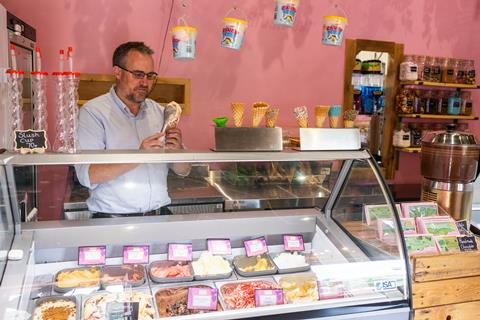
“The best products require the best ingredients.” That’s the policy of The Handmade Ice Cream Company, whose parlour sits in the picturesque countryside of the Lake District.
The business was founded by Steven Darvill, who spent 15 years working as a pastry chef. He noticed a big gap in their offer: “Chefs who were passionate about crafting their own ice cream often couldn’t, due to lack of time, space or equipment.”
Darvill set out to make creations a chef could be proud of serving, “free from all the funny business” of factory-made ice creams. Every ingredient is made in-house.
“Definitely our unique selling point is producing small batch natural ice cream, with no additives or preservatives,” sums up Darvill. “It’s more time-consuming and more expensive, but that’s the artisan way. And we believe it’s worth it.”
Those artisan credentials aren’t standing in the way of ambition, though. Darvill reveals the company is “actively seeking wholesalers to take our products further afield” and looking at the potential for national distribution.
LA-Pop
Location: Birmingham | Founded: 2017 | Sold in: Edgbaston store, and will franchise
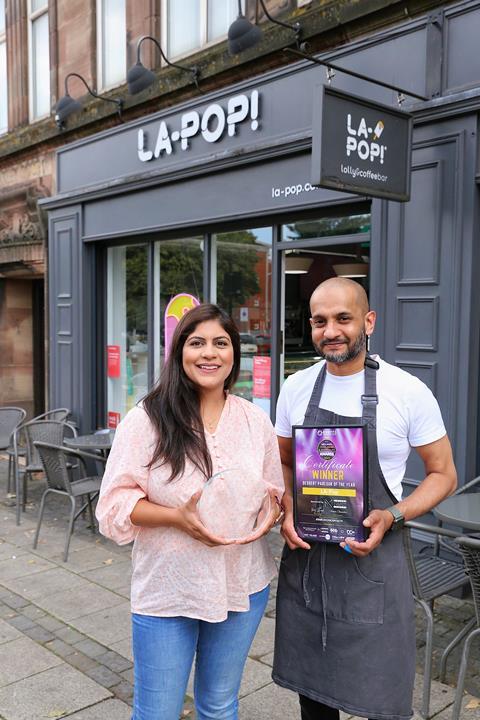
On a beach in Dubai, LA-Pop founders Abdul and Anum Kaium faced a question from their children.
“As our kids were tucking into their lollies on Jumeirah Beach, they said how they wished they could have their own ice cream shop,” recall the husband-and-wife team. “Most parents would have laughed off this kind of fantasy, but we held onto it – it looked pretty good to us!”
Abdul, a professional chef of more than 20 years, could see “Birmingham was crying out for a unique twist on an ice cream shop”. He set out to deliver that with LA-Pop, which specialises in gelato lollies that promise to taste as good as they look.
Customers can build their own lollies by choosing from a range of ice creams made with organic milk. That base is then covered in chocolate and topped with “an assortment of goodies”, ranging from crushed Oreo to crunchy caramel and marshmallows. “Over 700 different combinations” are possible, says Anum.
Currently, the lollies are sold from its one location in Edgbaston village, on the outskirts of Birmingham. There, it employs eight people.
But expansion is on the cards. LA-Pop is looking to create a franchise business in 2026, and Anum teases “really exciting” plans in autumn.







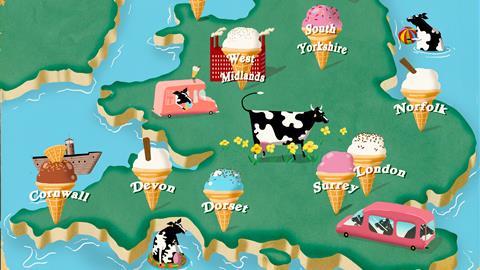



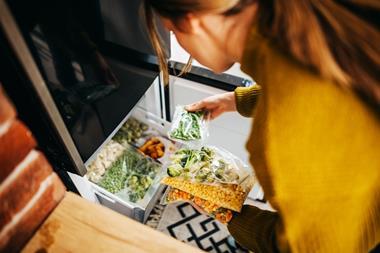
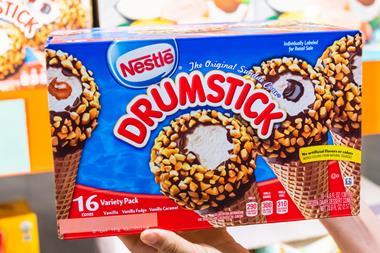
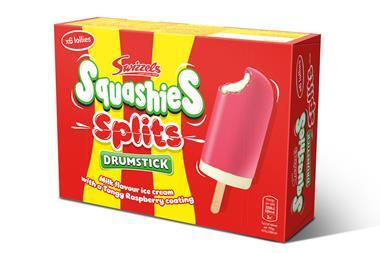






No comments yet